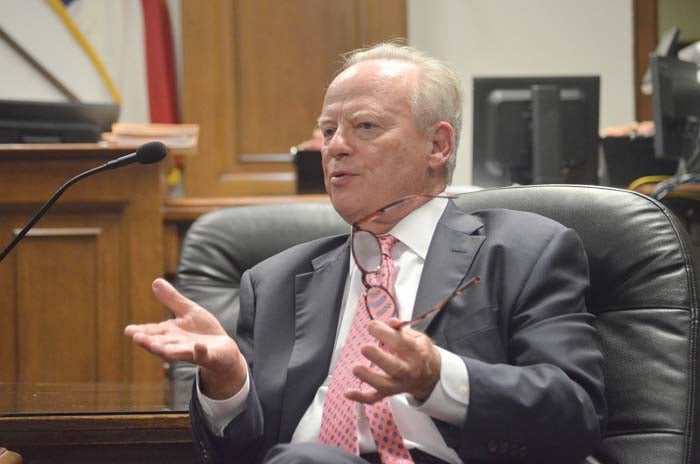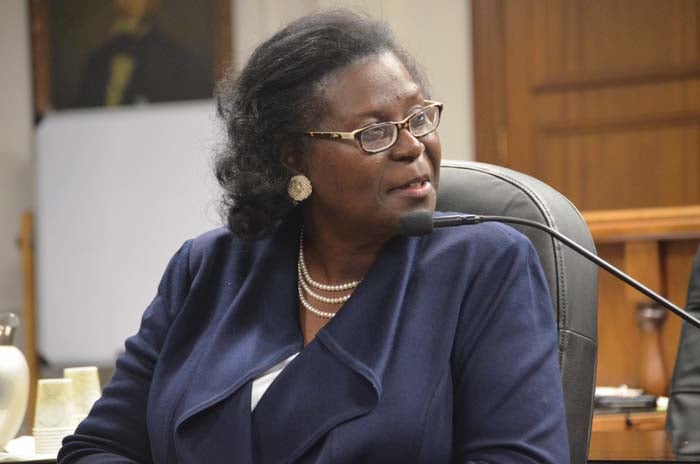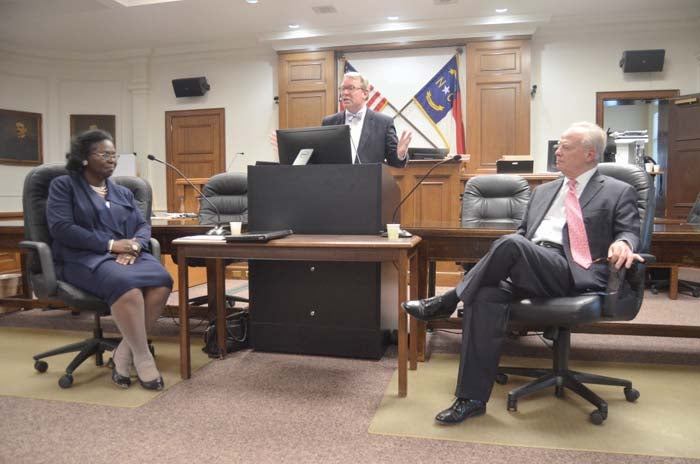Students, judicial officials hear justices reflect on state Supreme Court
Published 12:00 am Wednesday, September 25, 2019
SALISBURY — Two former associate justices of the North Carolina Supreme Court reflected on their time as members of the state’s highest court during a hourlong program Monday night at the Rowan County Courthouse.
The program was co-sponsored by Catawba College and the Rowan County Bar Association in preparation for next week’s sessions of the Supreme Court in Salisbury. Justices of the N.C. Supreme Court will hear two cases in the Rowan County Administration Building next Monday as part of the court’s bicentennial celebration.
Monday’s program featured former Justices Patricia Timmons-Goodson and Bob Orr.
Timmons-Goodson was the first African American woman to sit on the state Supreme Court, having been appointed in 2006 and elected to a full term that same year. She previously was a judge in District Court and on the state Court of Appeals. She is currently vice chairwoman of the United States Commission on Civil Rights.
Timmons-Goodson was nominated by former President Barack Obama to a District Court seat for the Eastern District of North Carolina in 2016.
Orr was elected to the state Supreme Court in 1994 after having served on the state Court of Appeals. He retired in 2004 to become director of the North Carolina Institute for Constitutional Law and sought the Republican nomination for governor in 2008.
Catawba College political science Professor Michael Bitzer, who is a frequent political analyst, led Monday’s forum.
“Anytime the public can have the opportunity to better understand the court system on an empirical level, it helps all citizens become better citizens,” Bitzer said.
Bitzer asked a series of questions. Here are summaries of the former justices’ responses.
Question: What made each of you want to serve as a judge?
Orr: Gov. Jim Martin called me and said there’s a vacancy on the Court of Appeals and I want to appoint you. And I confess that in all honesty, it had never crossed my mind that I would ever be a judge or that I was looking for a judgeship. And it just so happened that the opportunity presented itself. I enjoyed the experience and kept going for another 18 years or so.
Timmons-Goodson: The bench was not anything that I had thought about. Just because you have a plan for yourself, you must remain open to ideas presented by others. I was a prosecutor and I thought I was going to be the next greatest trial lawyer in the state of North Carolina because, after all, I won all of my cases in the DA’s office. But then they created a new District Court judgeship in the 12th Judicial District. And people began coming to me and saying, ‘You know, if I were you, Pat, I would think about that judgeship.’ Fortunately, I did listen to those who came along and suggested that I might make a good judge. Often others will find or see in you qualities long before you see them in yourself.
Q: Did you ever have to deal with death penalty cases?
Timmons-Goodson: When I was on the court in 2007, we had a few cases. I recall citizens holding a vigil for a person who was supposed to be put to death that evening. You had to walk from your car every evening past the people. There is an intensity there that you perhaps don’t have with other cases.
Orr: It literally is a life-and-death decision, particularly if there is an execution scheduled and motions have been filed with the court to stay the execution. It really was the most sobering aspect of the job.
Q: What is your average day like as a member of the state Supreme Court?
Timmons-Goodson: You have briefs, and the briefs will cite the legal issue and the research from respective parties. And there will be law clerks out there doing additional research. At this time, the justices are making sure that they have a clear understanding of the facts, the legal issues in the case or cases that come before them, and that they understand the law that relates to it. Based on that work, there’s going to be questions that will come to their minds. And so they’re formulating questions that they need to have answered from the bench. The bottom line is they’re preparing to hear the arguments and are preparing to discuss the legal issues with the parties.
Orr: For one week out of the month is when the court would hear oral arguments, and so the process that Justice Timmons-Goodson described is very much a typical court week. There’s a real sense of camaraderie on the days that you have oral argument. The justices would then gather together in conference and would vote on the cases. They would discuss the issues of the first case. Do we affirm it, do we reverse it? There would be a really qualitative, substantive discussion, not always in agreement among the justices. I think that was one of the real strengths of the Supreme Court process, is that every case was thoroughly discussed at that point in time. By the end of the process, each justice will decide which case they will write an opinion (for) — explaining how they will decide the case, why they are deciding it a particular way and why you’re ruling in that one case.
A number of Livingstone College and Catawba College students were in the audience as well as a Scout troop from St. John’s Lutheran Church. Area judges and attorneys also attended.
The Scouts, of Troop 443 and 443G, were there to hear the justices speak and earn a citizenship badge, said troop leader John McGrail. Nine children, three Scout leaders and one parent attended, he said.
“It’s a way for the public to be more informed and it’s a good way to educate people,” said Kaley Knight, a Catawba College politics and pre-law major.
Knight said she was grateful for the opportunity to have access to the former justices.
“It means a lot, especially Justice Timmons-Goodson. She is inspiring and makes me want to push more,” said Eryka Praileau, a political science major at Livingstone College.
Praileau, who is a member of the college’s political science club, wants to become an attorney and judge.
Anthony Bowman, president of the Livingstone College student government, said he found the forum informative. The senior biology major said the most interesting part for him was the chance to hear the justices discuss hearing arguments and writing opinions on death penalty cases.
Registration for next Monday’s N.C. Supreme Court session has closed, but there will be a live-stream available in an overflow room at the Rowan County Courthouse and at area schools, as well as Catawba, Livingstone and Rowan-Cabarrus Community colleges. Both sessions of court will be streamed on Facebook live at Facebook.com/NCcourts.
Anyone who has not received a confirmation of approval for tickets at either session should email rocosupreme2019@gmail.com for details.
The Rowan County Administration Building is at 130 W. Innes St. The court sessions will be at 9:30 a.m. and 11 a.m. in the county commissioners’ chambers.
Contact reporter Shavonne Walker at 704-797-4253.







